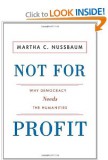Not for Profit: Why Democracy Needs the Humanities (The Public Square)

|
Title | Not for Profit: Why Democracy Needs the Humanities |
| Author | Martha Nussbaum | |
| Reviewer | Frederick Turner | |
| Review Date | October 25, 2011 | |
| Publisher | Princeton University Press | |
| Year | 2010 | |
| Rate this Book |
How could a devoted teacher of the humanities like this reviewer not like a book that is a ringing defense of the humanities in a world of educational “accountability”?
But alas, sometimes the best-intentioned friends can do as much harm as honest enemies. Martha Nussbaum sets out to diagnose and treat a demonstrable ailment in the institutions of the academic humanities: no argument there: “The humanities and the arts are being cut away, in both primary/secondary and college/university education, in virtually every nation of the world.”
Though Nussbaum concentrates on the U.S. and India in her analysis of the problem, with some glances at Europe and elsewhere, her conclusions about the facts are accurate. Indeed, her description of the rather horrifying criteria used by the most recent Labor government in Britain to qualify an educational program for financial support, with its chilling reductiveness and sneeringly leveling class resentment, is a very useful object lesson in what could happen in America if we do not find a better basis of understanding for the humanities and arts.
It is where Nussbaum theorizes the causes and reasons for the crisis in the humanities that her logic and evidence begin to go astray. Her basic premise is that the decline of the humanities and the elevation of such fields as business and engineering, result from a shortsighted lust for economic profit. “Seen by policy-makers as useless frills, at a time when nations must cut away all useless things in order to stay competitive in the global market, [the humanities and the arts] are rapidly losing their place in curricula, and also in the minds and hearts of parents and children.”
Nussbaum is by no means a neomarxist hater of capitalism or deconstructionist scourge of Europhallocentric epistemes, but she has been around the humanistic academy for long enough to miss the logical flaw in her argument. She asserts this causal sequence: global markets compel policy-makers to cut humanistic education budgets, and so parents and children lose their faith in the arts and humanities. Nussbaum may have been led astray by a false analogy between American and Indian government policy concerns, but even so it should be obvious that in the American case at least the causal sequence was exactly the opposite. That is, in the last few decades the arts and humanities disciplines, though at first well-funded, prestigious, and provided with a large stream of educated personnel, steadily forfeited the trust and affection of students at all levels, fatally alienated their parents, nurtured paranoid visions of a society that is relatively and historically decent, open, and democratic, and smeared the proudest achievements of its culture.
Any arts and humanities professor who has survived the political correctness purges of the seventies, eighties, and nineties can give you a long list of gifted graduate students whose idealistic visions of teaching literature or conducting philosophical inquiry or studying beauty and craft were gradually besmirched and lost. They either went into fields where truth, not political correctness, was the goal or indeed settled for a money-making life that could give them time to study what they loved as independent scholars or artists. Brilliant enthusiastic schoolteachers found themselves in the work-to-rule union shop of a totally unmeritocratic public school system, their aspirations to a humane inclusive appreciation of the great achievements of humankind condemned as classist, sexist, or racist.
Nussbaum is a great enthusiast for Socrates, arguing for the Socratic method. But if any single philosophical position has dominated the humanistic academy in the last few decades, it is that of the sophists who were his mortal enemies. If the public got tired of its sophism, who can blame them for their unconscious adherence to Socrates’ own devotion to truth, beauty, and goodness?
Only slowly and reluctantly did universities, and the alumni, federal, state and local organizations that supported them, recognize that their core disciplines had somehow betrayed their trust, and that humanities classes were dwindling in enrollment and becoming a financial drag on the other disciplines. Could taxpayers and patrons be expected to support whole departments devoted to “Theory” which amounted to a sustained assault on their deepest values? Meanwhile the popular media and the new electronic university of Google, Wikipedia, Bartleby, the Blogosphere and Amazon were becoming bountiful sources of great texts, imagery, music, argument, information, and fellow-enthusiasts: shepherdless, alas, and prone to error and falsification, but at least free and unpoliced by political correctness. We could get epic in summer blockbuster movies, rituals of flesh and spirit in rock concerts, classic drama in local theater productions, history in civil war reenactments and TV documentary series, philosophy in TED talks and a host of literate and intelligent blogs—and we could talk back.
“Accountability” is, as Nussbaum says, a disastrous and misconceived answer to the problem, an answer coming from the right wing here and from the left wing in England and Europe. But what other handle could the public get on the trahison des clercs? It was not the responsibility of governments or even trustee boards to correct the maniac logic and skewed facts of lockstep radical humanities departments, and academic freedom rightly forbade it. It is for the humanities and the arts to set their own houses in order by reasoned debate and persuasion, and meantime accept the response of the public in terms of lack of support and disfavor as an important chastening reminder of their mission, and a penance for having betrayed it.
For—and here of course Nussbaum is right—it is a vital and essential mission. The humanities and the arts are the memory and the imagination of a culture. Without them the best a society can do is perfect its technology to the point that it becomes so competitively cheap that it can no longer make a living by it. Increasingly the world is paying more and more for the products of what I call, slightly ironically, the charm industries: tourism, entertainment, adventure, religion, sport, fashion, fiction, film, computer games, cosmetics, cuisine, personal service, gardening, art, history, movies, ritual, psychotherapy, politics, the eternal soap opera of relationships. As with anything that demands skill, experience, and a tradition, these industries need experts, devotees, coaches, storytellers, archivists. There is a huge role for the humanities: it is up to us to rediscover it.
By the way, despite my adverse diagnosis of the troubles of my profession, I personally have high hopes for it. The new generation of professors contains many splendid, imaginative, and idealistic teachers, and many veteran humanists, scholars, and maestros have survived the firestorm. There are immensely promising initiatives in which the old divides between the sciences, the humanities and the arts are being transcended: neuroscience, anthropology, and human evolutionary science now offer a new foundation for the humanities; computers offer a wealth of opportunities for the artist and the scholar. Already I see signs in my own institution and others of an enthusiastic return to the literary classics of many nations and cultures and to the huge cultural heritage of the common human past, now recognized as reaching far beyond Europe. Students seem to me to be better prepared in many ways; texting has made them at least rough-and-ready communicators, the Internet has educated them in an extraordinary variety of hobbyistic topics and fields, and the best of them are remarkably free and imaginative thinkers.
Part of Nussbaum’s problem is her terminology itself. “Profit” has become in the mouths of the academy a gross, despicable and even evil word. But this may be a perversion: substitute its exact synonym, “benefit,” and the absurdity of Nussbaum’s basic assertion becomes clear. Is it really so terrible a thing to be benefit-seeking? Is the benefit-motive so bad? Even benefiteering? Of course the words are different in implication: but it is hard to avoid concluding that the difference is that I seek benefit, while he seeks profit. In the sense of the Prophet’s words “what doth it profit a man to gain the whole world if he lose his own soul?” If the arts and humanities have become profitless, it is up to them to change. Beauty, truth, and goodness are higher values than monetary wealth, but they are partly and properly exchangeable with it; and sometimes the exchange rate is rather encouragingly advantageous to the arts and humanities, as when a van Gogh sells for 26 million dollars at Sotheby’s or a student puts himself in hock for twenty years to get a PhD in literature. The public is willing to pay, but it wants truth, beauty, and goodness, not Theory.
The conclusion that one might draw from Nussbaum’s informative presentation of the facts, if stripped of her interpretation, is that perhaps the ideal of state education has partly failed, having become hostage to various rent-seekers and ideologues. The failure is perhaps inevitable, given the need for a democracy to eschew favoring any value system, indeed even any value that some citizen would regard as an infringement of his freedom. And now that truth itself has been declared by the deconstructionists to be just another patriarchal ideology, even the dissemination of truth cannot be made the goal of public education.
Nussbaum’s arguments for the benefits of humanities education boil down to the values of “critical thinking,” “diversity,” and “empathy”; but the examples she gives of them are essentially as ways to undermine traditional conservative values. It is all very well to cite American social stratification as the evil that indeed it is, but in the last hundred years the carnage resulting from new innovative humanistic secular ideologies— that were based on critical thinking about traditional values—has dwarfed, by at least one order of magnitude, the murder committed by traditionalists in defense of their values. Critical thinking can go both ways. Likewise, “diversity” is a two-edged sword, used adroitly now by evolution deniers and holocaust deniers to undermine conventional science and history. And, as Nussbaum herself rather brilliantly points out, empathy is a vital skill not only for the philanthropist but for the torturer. Critical thinking, diversity, and empathy cannot compete with truth, beauty, and goodness in the marketplace; they are less sure defenses of freedom, and they do no less harm.
If Nussbaum followed her own logic, she would perhaps have found another answer than the demand she makes of government to fund by force and taxes a set of academic institutions that have lost the trust of the public. She herself, toward the end of the book, lavishly praises the private individuals and institutions whose patronage has made the pursuit of the humanities and arts still feasible in private or semi-private academies. She is especially kind to the donors of her own institution, the University of Chicago. Perhaps the answer, then, for those who truly love the ancient missions of the arts and humanities, is in the private sector: what new Rockefellers will step forth to endow the liberal arts universities of the future?
Frederick Turner is the Founders Professor of Arts and Humanities at the University of Texas at Dallas. He is the author of sixteen books of poetry, criticism, and fiction, including The New World: An Epic Poem; Rebirth of Value; Meditations on Beauty, Ecology, Religion and Education;and Tempest, Flute and Oz: Essays on the Future.



